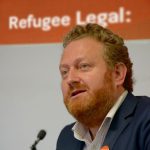The 1 October deadline: one year on
Thursday, October 4 2018| Dear Friend,
Early last year, the Federal Government imposed an arbitrary and final deadline of1 October 2017 for the 31,000 asylum seekers who had arrived by boat in Australia. Under this ‘lodge or leave’ policy, people were told to lodge a Temporary Protection Visa (TPV) application under the so-called Fast Track process by the deadline, or face deportation without the Government hearing their case. In response, through our TPV Clinics, we assisted thousands of people who’d fled from human rights atrocities in places like Myanmar, Afghanistan, Iraq and Sri Lanka – to apply for protection. On an almost weekly basis, we receive wonderful news from those who we’ve helped – women, men and families who have finally been granted protection. We have included some of these stories below. One year on, even though the deadline has well and truly past, thousands of people have still not had their applications processed. Instead, they remain in limbo, waiting for their case to be heard. In many cases, more than six years after arriving. The truth is: this processing has been beset by delay. To make matters worse, the Government are continuing to strip many people we help of basic income support, housing and torture/trauma counselling. This also applies to some we act for who’ve been evacuated from Nauru and Manus for emergency treatment. Through our TPV Clinics we continue to do all that we can to help those in need in this next stage of processing of their protection applications – as they face the final ruling on their fate. This includes providing vital legal assistance to the thousands of people who are being called to an interview with the Department of Home Affairs about their case. For those who are refused by the Department of Home Affairs, we’re advocating on review. And now, for many of those we’re assisting, there’s another looming deadline: the expiry of their three-year TPV. Thousands of vulnerable people who were, and will be, adjudged refugees must go through the application process again and re-plead their case for, at best, another three or five-year visa. And once again, putting their lives on hold under this cruel cycle of uncertainty. Herein lies the inherent injustice and inhumanity of the TPV policy: it inflicts further harm on people fleeing from harm. People we are obliged to protect. This fundamentally flawed public policy condemns tens of thousands of people in our community to perpetual uncertainty and re-traumatisation – cut off from a secure future and from family reunion. Deprived of the ability to rebuild their lives with a sense of safety and security together with us. This is why at Refugee Legal, we have been advocating for the abolition of temporary protection and the swift conversion of TPVs to permanent protection as part of our work for urgent and much-needed change to help break the cycle of injustice. In the meantime, one year on with people facing more rolling deadlines and delays which are their every day, we will continue to defend the rights of people seeking asylum and ensure they get a fair go before the law. Best wishes, David Manne Executive Director/Principal Solicitor Refugee Legal |
Contents of newsletter
|
|
Policy Update: September 2018
|
||
In other news |
||
 David Manne has been appointed to the advisory board of the new Peter McMullin Centre on Statelessness. The centre was established in 2018, with the objective to undertake research, teaching and engagement activities aimed at reducing statelessness and protecting the rights of stateless people in Australia, the Asia Pacific region and more. Please click here for more information. David Manne has been appointed to the advisory board of the new Peter McMullin Centre on Statelessness. The centre was established in 2018, with the objective to undertake research, teaching and engagement activities aimed at reducing statelessness and protecting the rights of stateless people in Australia, the Asia Pacific region and more. Please click here for more information.
|
||
 Annual Dinner: On Friday 19 October 2018, Refugee Legal will be hosting its annual dinner, celebrating 30 years of defending the rights of refugees, asylum seekers and migrants. This year, we are honoured that our keynote speakers will include Emeritus Professor Gillian Triggs, the former President of the Australian Human Rights Commission, and the new Chair of Justice Connect. Bookings https://www.trybooking.com/XZLP Annual Dinner: On Friday 19 October 2018, Refugee Legal will be hosting its annual dinner, celebrating 30 years of defending the rights of refugees, asylum seekers and migrants. This year, we are honoured that our keynote speakers will include Emeritus Professor Gillian Triggs, the former President of the Australian Human Rights Commission, and the new Chair of Justice Connect. Bookings https://www.trybooking.com/XZLP
|
||
 Last month, our executive director David Manne gave a farewell address on behalf of the Law Council Australia and Law Institute of Victoria, acknowledging the profound contribution and achievements of one of Australia’s finest jurists – that of Federal Court judge, His Honour Justice Anthony North. You can read his full speech here. Last month, our executive director David Manne gave a farewell address on behalf of the Law Council Australia and Law Institute of Victoria, acknowledging the profound contribution and achievements of one of Australia’s finest jurists – that of Federal Court judge, His Honour Justice Anthony North. You can read his full speech here. |
||
Our storiesIn this special edition, we wanted to share with you some personal stories of the people who have been caught up in the Fast Track Assessment process. Below are three stories that shed light on the different situations our clients face. |
||
Anwar’s StoryAnwar* was only 10 years old when he was first forced into slave labour for seven days, digging underground tunnels for the Burmese military. As a Rohingyan Muslim growing up in Burma, this is one of a litany of offences committed against him and his family by the Burmese government and military for as long as he can remember. Anwar is a young man whose life experience is unfathomable to most people in Australia. Forced to witness his father’s multiple imprisonments; denied citizenship documents; adequate healthcare; and the freedom to visit relatives, Anwar eventually left his family and fled to Malaysia while still just a child, hoping that life would be better for him there. However, without a passport or any documentation, his life in Malaysia was scarcely better. For seven long years, Anwar lived rough on building sites in Malaysia, perpetually in fear of his life. He was unable to move freely around the nation, and his existence was shrouded in secrecy. Wishing for a better life, Anwar travelled by boat to Australia in 2013, and has since been languishing in an immigration detention centre, waiting to lodge a protection application. He is only now being interviewed by the Department of Immigration. If unsuccessful and returned to Burma, Anwar fears he will be shot and killed by the Burmese military. Abdul’s StoryAbdul*, a young Hazara and Shia man in his 30s, fled his country of birth, Afghanistan, when he was a young child. After his uncle was killed during the war, Abdul’s family moved to Pakistan, hoping for a better life. However, living without rights in Pakistan meant foregoing basic rights such as access to education, resulting in Abdul only attending a couple of semesters at a language centre throughout his whole life. When Abdul arrived in Australia seeking protection, he was initially denied a temporary protection visa. Like many people in his situation, Abdul is at dire risk of being targeted by the Taliban if he is forced to return to Afghanistan. As a Hazara and Shia Muslim who cannot speak Dari (the local language), this puts him at great risk of harm. Abdul was eventually granted a three year Temporary Protection visa by the now defunct Refugee Review Appeals Tribunal in 2015. He is now required to go through the process of re-applying for his TPV. Abdul, who has for three years lived a quiet and productive life, is once again required to justify his refugee status to the Department of Immigration. Lacking formal education, Abdul has trouble speaking and understanding everyday English. Some of the few words he does know are those relating to his visa status: complicated legal terms that many Australians would have trouble understanding. To him, they are necessary: because even if he is granted another protection visa, the process will start again in three years’ time. And again every three years thereafter, until Australia’s cruel policy is overturned. Abdul doesn’t understand why he has to apply again after being accepted three years ago. His circumstances haven’t changed. His nerves are fried; he has been diagnosed with depression and anxiety. He is devastated. Amali’s StoryAmali* is a single mother who simply wants the best for her daughters. Just like any other mother, she strives to create a peaceful, happy life for her children, and takes pride in their accomplishments, be it doing well at school or making new friends. However, unlike many other mothers, Amali’s dreams are peppered with horrific violence; her leg routinely swells and throbs with pain; and her head pounds with the memories of abuse so horrific, she now suffers from acute PTSD. Amali is an ethnic Tamil woman from Sri Lanka, and her wounds are much deeper than physical. Having watched her husband taken away by soldiers almost a decade ago; witnessing the death of a relative, and surviving a horrific shelling attack have all left their mark. In 2012, Amali and her daughters arrived in Australia after a lifetime of persecution and violence in first Sri Lanka, and then Malaysia. Early last year, the family lodged their applications for the Safe Haven Enterprise Visa (SHEV), a five-year visa with limited pathways towards permanent protection in Australia. In 2018, they were all granted a visa. For the first time in her life, Amali is safe. She and her daughters can walk outside without fear of death, violence and persecution. Her eldest daughter, aged in her 20s, is studying biomedicine at Deakin University, hoping to become a doctor. Unfortunately, under the current policy, Amali’s small family will all have to re-live their trauma again as they are forced to reapply for their right to remain in Australia. In the meantime, they can heal, if only a little bit. *Story names have been changed. |
||
</td colspan=”2″>
- December 2024
- October 2024
- August 2024
- June 2024
- December 2023
- November 2023
- October 2023
- June 2023
- May 2023
- March 2023
- November 2022
- November 2021
- August 2021
- June 2021
- May 2021
- December 2020
- November 2020
- September 2020
- June 2020
- May 2020
- April 2020
- March 2020
- December 2019
- September 2019
- May 2019
- March 2019
- February 2019
- December 2018
- November 2018
- October 2018
- August 2018
- May 2018
- March 2018
- December 2017
- October 2017
- September 2017
- August 2017
- May 2017
- April 2017
- March 2017
- February 2017
- August 2016
- May 2016
- April 2016
- March 2016